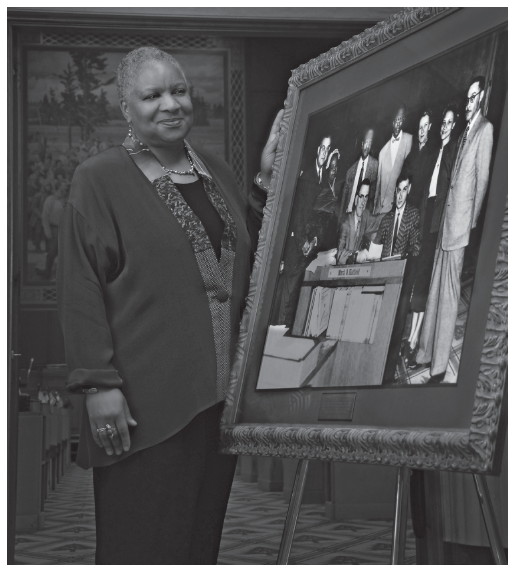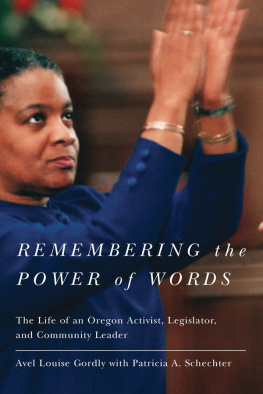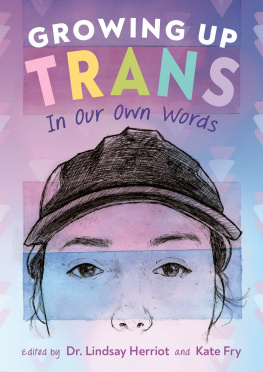Remembering the Power of Words

WOMEN AND POLITICS IN THE PACIFIC NORTHWEST
Series editor: Dr. Melody Rose, Portland State University
This series explores the many roles women have played in Northwest politics, both historically and in modern times. Taking a broad definition of political activity, the series examines the role of women in elected office and the barriers to their role in the electoral arena, as well as the examples of women as advocates and agitators outside the halls of power. Illuminating the various roles played by diverse and underrepresented groups of women and considering the differences among and between groups of women, acknowledging that women of the Northwest do not experience politics in a single, uniform way, are particular goals of this series.
The photograph on the previous page shows Avel holding a photo of the members of the N.A.A.C.P. Portland Branch who lobbied for passage of Oregons Public Accommodations Act in 1953 and the legislators who sponsored it. This historical photograph how hangs at Senator Gordlys initiative outside the Oregon House of Representatives chamber as a memorial to that historic achievement. Photograph by Charles Waugh, Charles Fine Art Portraits.
The paper in this book meets the guidelines for permanence and durability of the Committee on Production Guidelines for Book Longevity of the Council on Library Resources and the minimum requirements of the American National Standard for Permanence of Paper for Printed Library Materials Z39.48-1984.
Library of Congress Cataloging-in-Publication Data
Gordly, Avel Louise, 1947
Remembering the power of words : the life of an Oregon activist, legislator, and community leader / by Avel Louise Gordly with Patricia A. Schechter.
p. cm. -- (Women and politics in the Pacific Northwest)
Includes bibliographical references and index.
ISBN 978-0-87071-604-1 (alk. paper)
1. Gordly, Avel Louise, 1947- 2. African American politicians--Oregon--Biography. 3. Women politicians--Oregon--Biography. 4. African American women--Oregon--Biography. 5. Community activists--Oregon--Biography. 6. Oregon--Politics and government--1951- I. Schechter, Patricia Ann, 1964- II. Title.
F881.35.G67A3 2011
324.2092--dc22
[B]
2010049231
2011 Avel Louise Gordly and Patricia A. Schechter
All rights reserved. First published in 2011 by Oregon State University Press
Printed in the United States of America

Oregon State University Press
121 The Valley Library
Corvallis OR 97331-4501
541-737-3166 fax 541-737-3170
http://oregonstate.edu/dept/press
ISBN-13: 978-0-87071-614-0 (electronic)
DEDICATION
To
my parents, Beatrice Bernice Coleman Gordly and Fay Lee Gordly
my grandmothers, Lessie Gordly and Alberta Louise Randolph
and
my courageous son Tyrone Wayne Waters
I prefer to be true to myself, even at the hazard of incurring the ridicule of others, rather than to be false, and to incur my own abhorrence.Frederick Douglass
While we wait in silence for that final luxury of fearlessness, the weight of that silence will choke us.Audre Lorde
Successful leadership depends on a fundamental shift of being, including a deep committment to the dream and a passion for serving versus being driven by the pursuit of status and powerJoseph Jaworksi, founder, American Leadership Forum
For God hath not given us the spirit of fear, but of power, and of a sound mind.2 Timothy 1:7 KJV
Foreword
I have known Avel Gordly since we were third graders in a Portland public school. That would have been about 1955-56, shortly after passage of Oregons Public Accommodations Act in 1953. The first page of this memoir shows Avel holding a photo of the members of the N.A.A.C.P. Portland Branch who lobbied for that Act and the legislators who sponsored it on the day the Act was passed. Members of the N.A.A.C.P. lobbied for eighteen legislative sessionsthats thirty-six yearsbefore they succeeded in having a law passed that prohibited discrimination in public accommodations. Prior to the Act, African Americans were prohibited from most restaurants, hotels, swimming pools, amusement parks, and even hospitals. My parents Otto and Verdell Rutherford were leading the organization at the time the Act was passed and they are in the picture. I am honored that Avel has paid tribute to my parents and their comrades for their volunteer service and that she has asked me to write this foreword.
It is fitting that Avel has chosen to include this picture for a couple of reasons. First, the picture conveys Avels feeling that she is standing on the shoulders of those who came before her and that she has carried the legacy of those early activists forward in her roles as activist, legislator, and educator.
Second, the picture shows the results of a collaborative effort. This memoir is also the result of collaboration between Avel and Patricia Schechter, her friend and colleague from Portland State University. Patricia interviewed Avel as a participant in an oral history project. The interview has evolved into this bookan opportunity for the reader to see the private face behind a public person.
Avels public life is a matter of public record. For a complete professional biography, see http://www.pdx.edu/blackstudies/avel-gordly-biography. Briefly stated, Avel served in the Oregon State Legislature from 1991 to 2008. After serving three terms asa member of the House of Representatives, Avel was elected as Oregons first female African American State Senator in 1996. She retired from that position in 2008.
In addition to serving on various task forces and committees, during her tenure in office Avel was the chief petitioner for a constitutional amendment that removed racist language from the Oregon Constitution and for Oregons minimum wage law. She also sponsored the Expanded Options Bill, which many educators and advocates believed was the singular educational achievement of the 2005 legislative session; the Oregon Legislative Assemblys Day of Acknowledgment, renouncing Oregons legacy of institutional racism; and the first legislation in the nation to address the issue of children abducted by family members or others into whose care the children had been entrusted.
Among other legislation she sponsored were bills:
proclaiming Juneteenth, June 19 of each year, the day on which slavery was abolished in Texas in 1865, as a day for celebration statewide of dignity and freedom of all citizens;
creating the Governors Environmental Justice Task Force, which requires state agencies and the governor to work on issues of environmental justice in Oregon;
requiring every county police force to be trained in the use of appropriate deadly force;
creating the statewide Office of Multicultural Health;
requiring the availability of health care interpreters and the inclusion of people of diverse backgrounds on state health licensing boards.
Avel introduced resolutions honoring the lives, achievements, and heroism of Oregon citizens, including my parents, McKinley Burt, Bill McClendon, Ruth Ascher, Hon. Roosevelt Robinson, and Hon. Mercedes Deiz. Moreover, she organized a ceremony marking the fiftieth anniversary of the passage of the Public Accommodations Act, and honoring U.S. Senator Mark Hatfield, who carried the bill to passage as a young state legislator and is among those pictured in the photograph on the first page.















